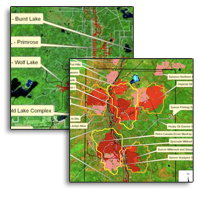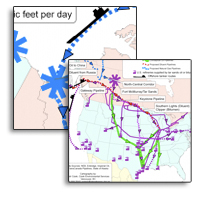Tar Sands 101
The Tar Sands "Gigaproject" is the largest industrial project in human history and likely also the most destructive. The tar sands mining procedure releases at least three times the CO2 emissions as regular oil production and is slated to become the single largest industrial contributor in North America to Climate Change.
The tar sands are already slated to be the cause of up to the second fastest rate of deforestation on the planet behind the Amazon Rainforest Basin. Currently approved projects will see 3 million barrels of tar sands mock crude produced daily by 2018; for each barrel of oil up to as high as five barrels of water are used.
Human health in many communities has seriously taken a turn for the worse with many causes alleged to be from tar sands production. Tar sands production has led to many serious social issues throughout Alberta, from housing crises to the vast expansion of temporary foreign worker programs that racialize and exploit so-called non-citizens. Infrastructure from pipelines to refineries to super tanker oil traffic on the seas crosses the continent in all directions to allthree major oceans and the Gulf of Mexico.
The mock oil produced primarily is consumed in the United States and helps to subsidize continued wars of aggression against other oil producing nations such as Iraq, Venezuela and Iran.
To understand the tar sands in more depth, continue to our Tar Sands 101 reading list
Application for North-Central corridor to bring Mackenzie Valley gas directly to the tar sands
TransCanada seeks permit for $983M gas pipeline
November 21, 2007
THE CANADIAN PRESS
CALGARY – A TransCanada Corp. (TSX: TRP) subsidiary is seeking permission to build a 300-kilometre natural gas pipeline in Alberta at an estimated cost of $983 million.
The North Central Corridor pipeline is designed to carry gas to ``growing intra-Alberta markets resulting largely from increased oilsands development," the company stated Wednesday.
TransCanada said Nova Gas Transmission's application to the Alberta Energy and Utilities Board comes after 11 years of consideration of the line.
An open letter to the Richardson Foundation re: investment in the Alberta Tar Sands
An open letter to James Richardson & Sons and the Richardson Foundation regarding investment in the Alberta Oil Sands and the damage being done to environment and health in the region and globally,
To the Richardson Family business and Foundation:
Upgrader fire ignites safety concerns
Upgrader fire ignites safety concerns
Last Updated: Tuesday, November 20, 2007 | 11:44 AM MT
CBC News
A third sour gas leak in two years at a Shell refinery northeast of Edmonton has some residents wondering how safe it is to live in the area known as Upgrader Alley.
A giant fireball erupted above Shell's Scotford upgrader near Fort Saskatchewan on Monday afternoon, sparked by a leak of the highly toxic and flammable gas. About 3,000 workers were sent home, but no one was injured in the incident.
Worker Rod Whitford said it wasn't a big scare.
Chávez and Ahmadineyad agree that the dollar empire is collapsing
Chávez and Ahmadineyad agree that the dollar empire is collapsing
http://www.granma.cu/ingles/2007/noviembre/mar20/47dolar.html
TEHRAN, November 19.— Venezuelan President Hugo Chávez stated today
in Teheran that “the dollar empire is collapsing,” according to ANSA.
“Soon we won’t be talking about dollars anymore because the value of
the dollar is in free fall and the dollar empire is collapsing,”
Chávez said to a group of journalists.
The Bolivarian leader visited Tehran, coming from Riyadh where he had
"Changing your light bulbs may not be enough to save a single polar bear"
Changing your light bulbs may not be enough to save a single polar bear,
but there are things we can do collectively - and easily - that will
really make a measurable difference in the battle against global
warming. Mark Lynas has a three-part plan.
by Mark Lynas
New Statesman (November 08 2007)
We have about 100 months left. If global greenhouse gas emissions have
not begun to decline by the end of 2015, then our chances of restraining
climate change to within the two degrees "safety line" - the level of
Record year for Nunavut oil spills
November 16, 2007
Record year for Nunavut oil spills
Mishaps pour 225,000 litres of poisonous material in territory
CHRIS WINDEYER
One big oil mishap on Brevoort Island this past January was enough to make 2007 a record year for spills in Nunavut.
Nearly 225,000 litres of oil were spilled into Nunavut's environment last year, the highest total recorded for Nunavut since division. The figures are found in Ikummatiit, the Government of Nunavut's energy strategy, which was tabled in the Legislative Assembly late last month.
Impacts of tar sands under scrutiny
Impacts of tar sands under scrutiny
By Sara Constantineau
News Writer
McGill Daily
An independent publication is trying to shock the public into understanding the social, environmental, and economic impacts of the Alberta tar sands.
The Dominion, an independent news cooperative, has launched a special issue about the tar sands with presentations at universities across Canada. The lead editors of the issue were at Concordia on Thursday night presenting their research and exclusive footage.
Editorial: Reconsidering the tar sands
Editorial: Reconsidering the tar sands
McGill Daily
Going by mainstream media coverage, the Athabasca tar sands in Alberta are like a 21st century Wild West: breathless reports speak about the “boom” economy, bushels of money being made, and about how everything is gigantic. But as the tar sands have become the centrepiece of a new energy corridor sending oil and gas to the U.S., scant attention has been paid to the profound economic, ecological, and social costs that are at stake.
Future of Alberta Tar Sands & oil could be decided in B.C
Future of Alberta oil could be decided in B.C
Charles Frank , CanWest News Service
Published: Sunday, November 18, 2007
The future of Western Canada's energy industry may well be defined by what happens far from Alberta's foothills in the quiet town of Kitimat on British Columbia's picturesque coast.
New life for Kitimat on horizon? Tar Sands to Move in on Douglas Channel
This article is interesting not only for the garbage it states, such as: "Environmental groups argue the massive tankers have no business travelling in the pristine and wildlife-rich waters, which they believe are protected by a more than three-decade-old moratorium on such traffic.
"The primary beneficiary of these projects is not British Columbians -- it's Albertans and Americans," says Will Horter, executive director of the Dogwood Initiative [...]"



